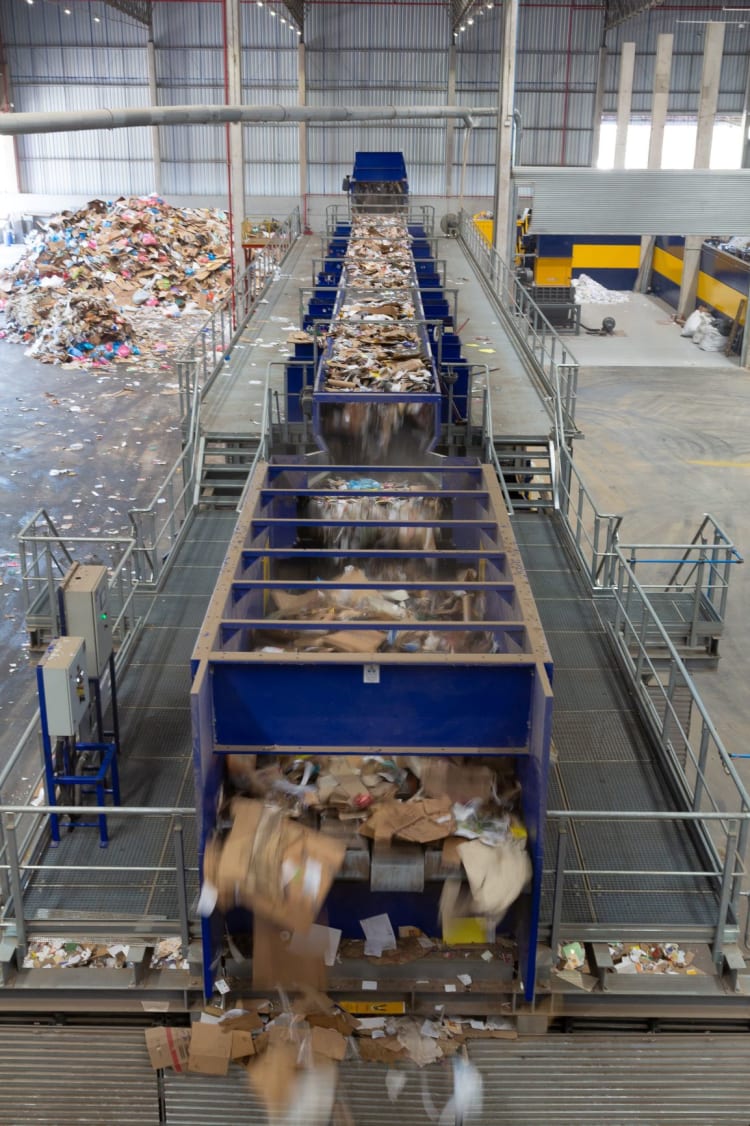A flexible approach tailored to the customer
Stadler has developed its extensive experience through a highly flexible approach to each project, every time developing a solution tailored to the individual requirements of the customer.
Silvio Urias Pereira, Managing Director of Brazilian waste management company Flacipel Comércio de Aparas e Sucatas Ltda, part of the Multilixo Group, found this to be the case when Stadler designed a new sorting plant for dry recyclable material: “Stadler works very closely with the customer. They accompanied us during the entire adjustment and training phase for production and maintenance. Their technical staff have a comprehensive knowledge of both the plant and the materials, which makes for an excellent partnership.”
The plant processes a very heterogeneous material input, which goes through a pre-sorting that uses a Stadler ballistic separator PPK2000 at the end of the line. It continues with a bag opener, two Stadler ballistic separators STT5000, 2 magnets, 9 optical sorters, an eddy-current separator and a suction system.
“This project has been in the planning stages for almost eight years and thanks to working together with Stadler it became possible,” says Silvio Urias Pereira. “It was a 4 hands job, joining FLACIPEL’s knowledge of the material and of the demand for quality of the final product with the good performance and technology of Stadler's equipment. With this plant, it is possible to meet the high demands of our market, meeting the expectations of our customers with a differentiated and quality product.”
Flexibility built into the design and delivery process
“The key challenges to address when designing and building a plant for dry mixed recyclables and light packaging are the changes in material composition, in the packaging and in purity requirements, because they can affect the quality and recovery of the products” explains Jürgen Berger. “These changes can happen between the design phase and final plant commissioning, and this possibility needs to be factored in. At Stadler we have the experience to address these issues by integrating flexibility and spare capacity in our design.”
This approach was particularly important when Stadler designed a future-proofed, flexible sorting plant for the Schroll Group in France, for whom the company had previously designed and built 5 plants. On the customer’s request, the facility was designed to allow for future expansion and the sorting of further fractions, as well as the possibility of installing robots. Stadler addressed this demand by including two independent sorting lines – one for the treatment of multi-material and one for hollow material – a set-up that gives more flexibility.
Vincent Schroll, co-owner of the Schroll Group, appreciates Stadler’s ability to innovate, developing new products that meet the changing needs: “the technical evolution of the equipment meets the growing requirements of our sorting centers.” Pascal Schroll co-owner, adds: “We appreciate Stadler's ability to meet commitments, advise us and respond to changes during equipment setup.”

Meeting the growing demand for recycling
The push to address the global waste issue by working towards a circular economy is driving a growth in the recycling sector. As a result, Stadler has seen an increase in the demand for new sorting plants as well as upgrades and expansions of existing facilities.
This was the case of Viridor, one of the UK's leading recycling, resource and waste management companies, which undertook a £15.4m upgrade of its Masons Materials Recycling Facility (MRF) in 2020. As one of two developers of this plant, Stadler transformed its operation, increasing its capacity from 65,000tpa to 75,000tpa and significantly improving output quality, achieving 98.5% purity on newspapers and pamphlets and 95% for polymers such as PET, HDPE and mixed plastics.
Viridor Recycling Director, Colin Richardson, said: “This was by far the largest investment in a UK MRF in recent years. Viridor is focused on developing opportunities to put quality recycling materials back into the economy where they belong. The Masons investment plan has been specifically designed not only to achieve greater capacity but to match the quality of its output with market requirements. The plant now has the same infeed material as before, but the upgrade has resulted in us being able to cope with an additional 10,000 tonnes of material per annum. We are pleased with the performance of the plant and its equipment since the upgrade was completed.”


